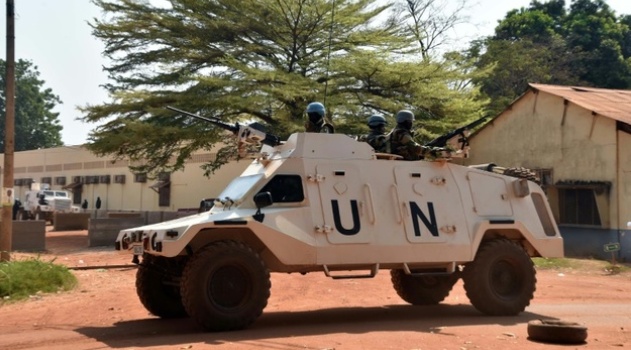
The United Nations MINUSCA force has been badly shaken by a wave of allegations that its peacekeepers in the Central African Republic raped girls and exploited women/AFP
UNITED NATIONS, New York, Apr 1 – More than 100 victims have come forward in the Central African Republic with appalling new accounts of sexual abuse, including bestiality, by UN peacekeepers and French troops, the United Nations said Thursday.
UN Secretary-General Ban Ki-moon was “shocked to the core” by the allegations that emerged after a UN team traveled to south-central Kemo prefecture to interview the women and girls.
“We must face the fact that a number of troops sent to protect people instead acted with hearts of darkness,” UN spokesman Stephane Dujarric said.
UN rights officers have so far interviewed 108 alleged victims, “the vast majority” of whom are under-age girls who were raped, sexually abused or exploited by foreign troops, he said.
UN teams received accounts that troops from France’s Sangaris force coerced girls to engage in bestiality in return for small amounts of money.
AIDS-Free World, a civil society group that tracks peacekeeper sex abuse cases, said three girls told a UN rights officer that in 2014 they were tied up and undressed by a Sangaris commander inside a camp and forced to have sex with a dog.
Dujarric stressed that “the facts have not been ascertained” in what could be the most serious wave of allegations to date to hit the troubled peace mission in the Central African Republic.
France’s UN Ambassador Francois Delattre and US Ambassador Samantha Power both called the allegations “sickening.”
French authorities are determined to “shed full light” on the reported cases and will take “exemplary disciplinary action” if the allegations are substantiated, said Delattre.
France sent its Sangaris intervention force to the Central African Republic in December 2013 and while the troops are not part of the UN mission, they have been mandated by the Security Council to help restore peace to the country.
‘Widespread’ abuse
After the UN Security Council held a closed-door meeting on the latest allegations, US Deputy Ambassador David Pressman said they appeared to show that the abuse was “widespread and systematic.”
Describing the claims as “extremely concerning”, Pressman said they should be met with a “swift, full and urgent response.”
UN rights chief Zeid Ra’ad Al Hussein called for investigations that “leave no stone unturned.”
Under UN rules, the responsibility for investigating and prosecuting peacekeeper sexual abuse lies with the countries that contribute the troops and police to the peace missions.
In a first, Dujarric said the United Nations would carry out joint investigations with Burundi and Gabon of the allegations that took place between 2013 and 2015.
The Central African peacekeeping operation, known as MINUSCA, counts about 12,600 foreign police and soldiers, as well as more than 500 foreign civilians.
The UN mission took over from an African Union force in September 2014 as the country was still reeling from a wave of sectarian bloodshed.
As disturbing allegations of sexual assault by troops targeting civilians mounted, Ban in August fired the mission chief, but new claims have continued to emerge.
Earlier this week, the United Nations reported two new cases of sexual abuse by Burundian and Moroccan troops, including one that involved a 14-year-old girl.
In an interview with AFP before the bestiality allegations were disclosed, UN peacekeeping chief Herve Ladsous denounced the wave of allegations as “abominable”.
“I am pushing for two ideas: firstly, contributor countries must agree to hold court martials on the spot, where their troops are serving,” he said in Central Africa’s capital Bangui.
“Secondly, when Blue Helmets are recruited, DNA samples should be taken — on a confidential basis,” he added, explaining these biological records could prove crucial to establishing the truth of any future allegations.














































